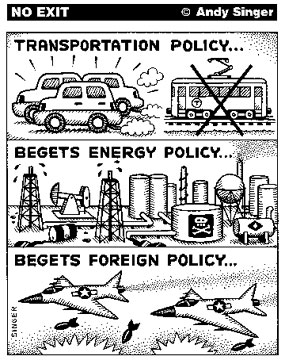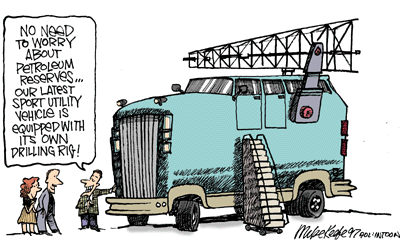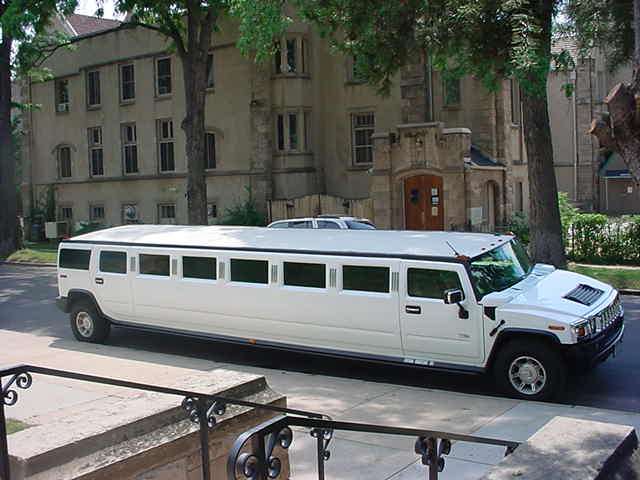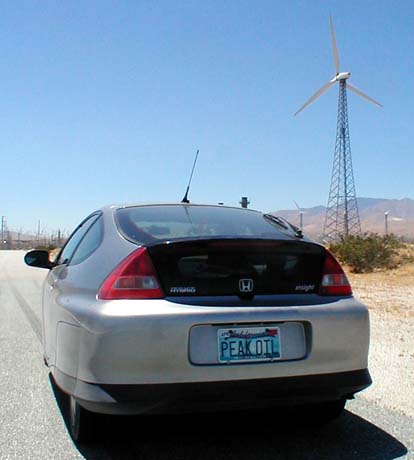100 mpg cars are here
but they cannot solve oil dependency
100 miles per gallon = 42.5 kilometers per liter
100 miles = 160 kilometers
1 gallon = 3.78 liters

related pages:
- 55 mph speed limit would reduce US oil use more than Alaska Pipeline
- Electric Cars: nice technology but it won't replace existing systems
The energy bill passed by the U.S. Congress and signed into law by Bush in December, 2007 includes a requirement for increasing the fuel efficiency standard for cars to 35 miles per gallon by the year 2020. This is the first efficiency increase since the administration of George Bush the First (there were not any efficiency increases mandated during the eight years of Clinton / Gore, not even when the Democrats controlled both houses of Congress).
Few media stories about this 2007 efficiency mandate noted
- most of the politicians promoting it will be out of office by the time this deadline arrives,
- it would not take over a decade to retool car factories to meet this new requirement,
- Peak Oil makes it nearly certain that faster requirements for efficiency will be required long before 2020,
- the US could immediately reduce oil consumption by an estimated 4% by rolling back highway speed limits to 55 mph (90 kph), a policy originally enacted by Richard Nixon in the wake of the 1973 Saudi Oil Embargo. This would reduce more oil consumption than the current flow through the Alaska Pipeline and would not require any technological innovations, merely psychological acceptance of the need for conservation. (statistic source: "Saving Oil in a Hurry: Oil Demand Restraint in Transport," by International Energy Agency, Workshop: Managing Oil Demand in Transport, Paris, 7-8 March, 2005)
No
need to wait to make cars more efficient |
2004 Presidential candidate Howard Dean: "I support an across-the-board corporate average fuel economy (CAFE) standard of 37.5 mpg by 2015. This would apply to all passenger vehicles, and would require a closing of the SUV loophole. By harnessing Americans' unparalleled ingenuity, we can move our nation towards a clean and efficient energy economy - one that will stimulate economic growth, reduce our reliance on Middle East oil, and protect the environment."
2015 would be well after the second term for a new President elected in 2004. 37 mpg is woefully inadequate given existing technology that is much more efficient.
We don't need any new technology for more efficient cars - just new politics. However, cars capable of 100 miles per gallon (42 kilometers per liter) aren't "sustainable," merely efficient.
The Environmental Impact of The Car, a 1992 report from Greenpeace, describes the numerous ecological impacts of petroleum extraction, oil wars, air pollution and other car related threats, and includes practical suggestions for alternative and efficient transportation.
| Efficiency of Cars Not Yet For Sale | MPG (Highway) |
| Toyota AXV | 110 |
| Renault Vesta2 | 107 |
| GM Ultralite | 100 |
| VW VW-E80 | 99 |
| Ford (unnamed) | 92 |
| Peugeot VERA+ | 87 |
| Volvo LCP 2000 | 81 |
| Renault EVE+ | 81 |
| GM TPC | 74 |
| Source: Greenpeace, "The Environmental Impact of the Car" (1992) | |
"Every time I see an adult on a bicycle, I no longer despair for the future
of the human race."
-- H. G. Wells, 1904
www.greenpeace.org/~climate/smile/dirty/6rhetoric.html
higher mpg 's
www.kunstler.com/mags_ure.htm
(the future of cities)
"Shark-nosed automobiles streamed in endless caravan through the gentle acid rain, spraying one another with a film of insoluble filth, a vicious servility oozing by in grease. .... (p. 102)
"Doctor Sarvis, laboring on his bicycle up the long grade of Ninth South toward his home on 23rd East, was not unaware of the pressure of the traffic accumulating in his rear, the clamor of horns pounded by impatient fists, the motorized hatred fermenting at his back.
"But he thought, Fuck 'em.
"Let 'em wait. Let 'em fester. Let 'em walk. Let 'em ride a bike like me, would do me and them and everybody a world of good. Cleanse our city's air, reinvigorate the blood, tone up the muscles, strengthen the heart, burn up that surplus fat, stave off arteriosclerosis, cut down on bypass operations, eliminate transplants, lower the cholesterol count, prolong lives. Yes and reduce oil consumption, slow down the waste of steel and rubber and copper and glass, free human labor and engineering skills for important work -- anything bad for the auto industry and bad for the oil industry is bound to be good for America, good for human beings, good for the land." (p. 107)
-- Edward Abbey, "Hayduke Lives!"
"Above all, it is the young who succomb to this magic. They experience the triumph of the motorcar with the full temperment of their impressionable hearts. It must be seen as a sign of the invigorating power of our people that they give themselves with such fanatic devotion to this invention, an invention which provides the basis and structure of our modern traffic." -- Adolf Hitler"in the prehuman environment much of that carbon removed from the atmosphere by green plants was locked safely away in the earth, where it could not be returned to the air by respiration. Disregarding his own need for a nearly carbon-free atmosphere, man perceived the deposits of coal and petroleum not as safe underground storage of natural pollutants, but as 'fossil fuels'; he set about eagerly unearthing them to fulfill his growing demand for energy."
-- William R. Catton, Jr., "Overshoot: The Ecological Basis of Revolutionary Change," p. 99
"From an airplane above an American city, the only human activity visible was the movement of cars. ....
"From a closer view, the movement and noise of cars dominated the urban landscape. In human minds routes and the vehicles that connected them often seemed more compelling than the places the routes supposedly served .... At any given moment, a vast part of the population was busy manufacturing or repairing cars, or servicing cars through highway and street work, gas stations, police forces and courts, licensing and taxing bodies, insurance companies, hospitals, morgues and mausoleums. Everything considered, the automobile consumed well over an eighth of all the productive capacity of the American economy ....
"Drivers thought of their vehicles merely as convenient (though increasingly expensive) machines to convey them from place to place. But cars inevitably functioned also as parts of the biosphere. In each one, a powerful internal combustion engine turned over insatiably, gulping in several gallons of gas per hour, mixing it with large quantities of air, and expelling the polluted air exhausts, like one long, continuous, carcinogenic fart. So markedly did the voracious cars out-breathe humans that there was no particle of air in metropolitan areas that had not previously passed through the cylinders of at least one car, and bore in the noxious gases and particulates that it carried the traces of that passage." --Ernest Callenbach, "Ecotopia Emerging," p. 77-78


the Hummer limosine
the latest trend for conspicuous overconsumption of dwindling
resources is the
Hummer Stretch Limousine
www.limousine-denver.com/hummer-limos.htm
has some nice photos of these behemoths
no mention of how many gallons per mile they require
(if you are concerned about their fuel consumption, you probably won't be
renting a Hummer Stretch Limo)
One assumes their manufacturers and owners are completely clueless about oil depletion.
Hummer limos are one of our civilization's parallels to the
social reaction to ecological overshoot on Easter Island, whose inhabitants
stripped the forests, reducing the island's capacity to support their society.
As ecological collapse accelerated, the society's elites developed fancier
and fancier methods of showing off their wealth with distractions (giant statues)
that diverted energy from looking at their problems. When it was all over,
their descendents couldn't remember a time when the island was forested.
How will our great-great-great-great-grandchildren remember the age of oil?
Will we use some of the remaining oil as a "bridge" toward a more
harmonious, less unsustainable society? It takes energy to make solar panels
and windmills, and it will take energy to relocalize food production.
www.eco-action.org/dt/eisland.html Easter Island deforestation - a warning
www.hartford-hwp.com/archives/24/042.html more on Easter Island

Washington, D.C. - January 26, 1991 - Bush vs. Iraq (Desert Storm)

www.cbsnews.com/stories/2005/04/15/60minutes/main688454.shtml
Flying Cars Ready To Take Off
www.wired.com/news/autotech/0,2554,67271,00.html
Hybrid Could Fill Humvee's Boots By John Gartner
02:00 AM Apr. 21, 2005 PT
.... the military is developing a hybrid Humvee alternative that could boost the market for combination combustion-electric vehicles. ....
The vehicle is powered by a small, three-cylinder diesel engine and two hybrid motors. It would cost about $20,000 to manufacture and could replace a $65,000 Humvee, Almand said. The vehicles are expected to get about 50 miles per gallon, compared to the Humvee's current 11 mpg.




